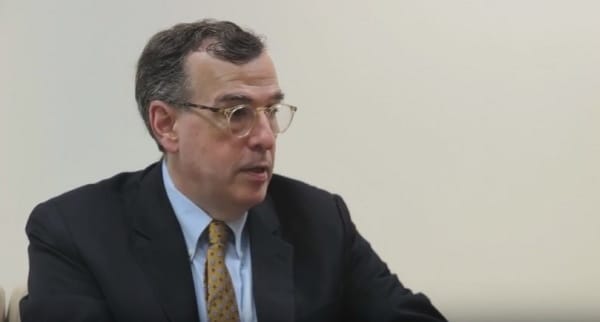The United States will soon select its next leader. But how do Asians perceive the Presidential race, and what can we expect from US policy in the coming years? Last month, the SIIA hosted an evening talk on the US election. We spoke with one of our panellists, Mr. Frank Lavin, former US Ambassador to Singapore and former Director of the Office of Political Affairs in the White House in a brief interview. We previously interviewed Mr. Lavin in December last year, earlier in the election campaign.
The SIIA’s 3-on-3 is a series of short interviews, asking three questions in approximately three minutes. Video of the interview will be available soon.
Q. Now that we know it’s a race between Donald Trump and Hillary Clinton, what do you feel is the sentiment in Asia towards the election and the candidates?
Mr. Lavin: My sense is the leadership in Asia is generally more comfortable with Hillary Clinton. You’ve got to work with whoever wins, and so it will be unusual I think for a foreign leadership to articulate a preference. But first of all, Hillary Clinton is more of a known quantity, having served as Secretary of State and in the public light. Secondly, Donald Trump has made several statements that, run contrary to some of the governments’ preferences in the region, such as looking at the possibility of Japan and Korea undertaking their own nuclear program. So that’s unsettling in those countries as well as in the neighbouring countries.
Q. You’ve remarked that US foreign policy does not actually change much between Presidents. Is this still the case? Several tenets of US policy have been challenged in this campaign.
Mr. Lavin: Well, I’d say this. I think there’s a higher degree of continuity in US foreign policy than one might suppose if one only watched the campaigns. Because campaigns tend to accentuate the differences, but in fact if you look at US behaviour during the Cold War we do see a high degree of continuity. If you’re looking at post war Cold war period, we saw a high degree of continuity. Now I think you’re also right that tendency is probably fading a bit, because we no longer have those unifying goals or post-Cold War principles. So I think we’re seeing the bell curve flatten a bit in terms of policy outcomes. But what we’d say is for the most part, presidential candidates do favour and engage a United States that is showing leadership around the world, working with alliances, engage through defence commitments, using soft power high consensus. So those tendencies I think tend to hold across the political spectrum.
Q. The TPP has become a surprisingly hot-button issue among US voters. America’s friends and partners are now wondering what will happen with the TPP. How can the US reconcile this?
Mr. Lavin: I think it’s difficult to say. In general in the leadership in the United States, there’s a strong belief in the importance of TPP for both political and economic reasons, that helps anchor the United States in the region, and it does contribute to U.S. prosperity as well as Asia’s prosperity, so that’s a leadership view. However, as we’ve seen over the past year, it’s also sensitive politically. There’s at least a significant constituency of Americans who project their economic anxiety against trade liberalisation and view free trade agreements or any liberalisation as harmful to US interests and harmful to the economy, and the current presidential candidates, both Hillary Clinton and Donald Trump are responding to that sentiment. So right now, this moment, leadership view is very much against TPP, but we’ll have to take stock after the elections are over, and see where things stand.




